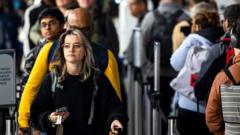The United States is bracing for a significant Arctic weather system just as millions prepare to travel for the Thanksgiving holiday, one of the busiest travel periods of the year. According to the National Weather Service (NWS), "dangerously cold wind chills" are expected across the northern Plains by Thursday, coinciding with peak travel days. The latest forecasts indicate heavy snowfall will likely blanket regions in New England, while the East Coast could experience thunderstorms.
Air travel disruption is already evident, with tracking service FlightAware reporting thousands of flight delays and numerous cancellations. Wednesday alone saw more than 4,500 delays and 61 cancellations as holiday travelers faced adverse conditions. The expected heavy snow could impact states like Maine, New York, and parts of the northern Appalachians, as warned by BBC Weather presenter Elizabeth Rizzini.
On the southern front, states including Georgia and the Carolinas are poised to face severe thunderstorms. As the weather system moves inland by Friday, the Midwest can anticipate a mixture of lake-effect snow and thunderstorms, with some areas receiving up to 8 inches (20 cm) of snow, primarily around the Great Lakes.
The Transportation Security Administration (TSA) estimates record-high passenger volumes at airports, with nearly nine million anticipated to pass through security during the busiest travel days—the days leading into Thanksgiving and the Sunday afterwards. This surge in travel is partly driven by a decrease in fuel prices compared to last year, prompting nearly 80 million Americans to plan car trips exceeding 50 miles.
Meanwhile, over in the Pacific Northwest, forecasters issued dense fog warnings for Thursday in California and freezing fog alerts for Oregon and parts of Washington. Earlier in the week, a winter storm unleashed heavy snow and high winds in elevated regions, while central California faced another bout of "atmospheric river" conditions.
Communities in the region are still recovering from the aftermath of a bomb cyclone that caused severe flooding and power outages just last week. As Thanksgiving approaches, families are being reminded to stay updated on weather conditions as they embark on their holiday journeys.
Air travel disruption is already evident, with tracking service FlightAware reporting thousands of flight delays and numerous cancellations. Wednesday alone saw more than 4,500 delays and 61 cancellations as holiday travelers faced adverse conditions. The expected heavy snow could impact states like Maine, New York, and parts of the northern Appalachians, as warned by BBC Weather presenter Elizabeth Rizzini.
On the southern front, states including Georgia and the Carolinas are poised to face severe thunderstorms. As the weather system moves inland by Friday, the Midwest can anticipate a mixture of lake-effect snow and thunderstorms, with some areas receiving up to 8 inches (20 cm) of snow, primarily around the Great Lakes.
The Transportation Security Administration (TSA) estimates record-high passenger volumes at airports, with nearly nine million anticipated to pass through security during the busiest travel days—the days leading into Thanksgiving and the Sunday afterwards. This surge in travel is partly driven by a decrease in fuel prices compared to last year, prompting nearly 80 million Americans to plan car trips exceeding 50 miles.
Meanwhile, over in the Pacific Northwest, forecasters issued dense fog warnings for Thursday in California and freezing fog alerts for Oregon and parts of Washington. Earlier in the week, a winter storm unleashed heavy snow and high winds in elevated regions, while central California faced another bout of "atmospheric river" conditions.
Communities in the region are still recovering from the aftermath of a bomb cyclone that caused severe flooding and power outages just last week. As Thanksgiving approaches, families are being reminded to stay updated on weather conditions as they embark on their holiday journeys.





















